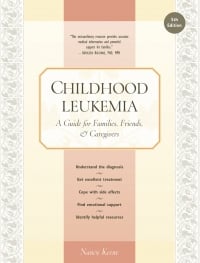Childhood Leukemia
The Entire Clinical Trial Document
If your child is enrolled in a clinical trial, the roadmap described earlier is actually a very small portion of a lengthy document describing all aspects of the study. The entire document usually exceeds 100 pages and covers the following topics: study hypothesis, experimental design, scientific background and rationale with relevant references from the scientific literature, patient eligibility and randomization, therapy for each arm of the study, required observations, pathology guidelines, radiation therapy guidelines (if applicable), supportive care guidelines, specific information about each drug, relapse therapy guidelines, statistical considerations, study committee members, record-keeping requirements, reporting of adverse drug reactions, and a consent form.
The clinical trial that my child was enrolled in had three arms—A, B, and C. He was in the A portion, so we only referred to the A section of the protocol, which clearly outlined each procedure and drug to be given for the duration of the trial. It also listed the follow-up care required by that particular clinical trial.
The full protocol is intended for use by specialists in oncology. It is highly technical and may be confusing or overwhelming for some parents.
However, some parents are medical professionals or people who want to better understand their child’s illness and treatment. These parents may want to have a copy of the full study document for several reasons. First, it provides a description of some previous clinical trials and explains the reasons the investigators designed this particular study. Second, it provides detailed descriptions of drug reactions, which may comfort parents who worry that their child is the only one exhibiting extreme responses to some drugs. Third, motivated parents who have only one protocol to keep track of sometimes prevent errors in treatment. Finally, for parents who are adrift in the world of cancer treatment, it can give them a bit of control over their child’s life.
Since knowledge is comfort for me, I really wanted to have the entire clinical trial document, despite its technical language. Whereas the brief protocol that I had listed day, drug, and dose, the expanded version listed the potential side effects for each drug, and what actions should be taken should any occur. I needed all of that information.
Other parents may find that reading hundreds of pages of technical information is overwhelming or not helpful. As with almost every topic discussed in this book, families need to make choices based on what works best for their unique situation.
If your child is enrolled in a clinical trial and you would like a copy of the entire document, ask your child’s oncologist for a copy. If the oncologist will not provide it, call COG (626-447-0064) and ask for a copy. Informed consent documents for COG trials specifically state that families will receive a copy of the full protocol upon request. After reading the document, it may be helpful to schedule an appointment with your child’s oncologist, nurse practitioner, or research nurse to discuss any questions or concerns.
The full clinical trial document is not for general distribution because it is unethical to use these protocols outside a controlled research setting. Parents who obtain a copy should not share it with others.
Table of Contents
All Guides- Introduction
- 1. Diagnosis
- 2. Overview of Childhood Leukemia
- 3. Acute Lymphoblastic Leukemia
- 4. Acute Myeloid Leukemia
- 5. Juvenile Myelomonocytic Leukemia
- 6. Chronic Myelogenous Leukemia
- 7. Telling Your Child and Others
- 8. Choosing a Treatment
- 9. Coping with Procedures
- 10. Forming a Partnership with the Medical Team
- 11. Hospitalization
- 12. Central Venous Catheters
- 13. Chemotherapy and Other Medications
- 14. Common Side Effects of Treatment
- 15. Radiation Therapy
- 16. Stem Cell Transplantation
- 17. Siblings
- 18. Family and Friends
- 19. Communication and Behavior
- 20. School
- 21. Sources of Support
- 22. Nutrition
- 23. Insurance, Record-keeping, and Financial Assistance
- 24. End of Treatment and Beyond
- 25. Relapse
- 26. Death and Bereavement
- Appendix A. Blood Tests and What They Mean
- Appendix B. Resource Organizations
- Appendix C. Books, Websites, and Support Groups

